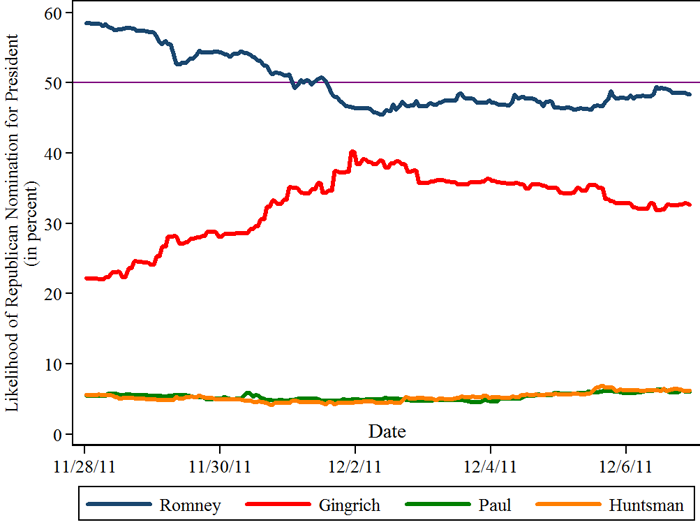Romney is still out front in the prediction markets
Mitt Romney remains the frontrunner for the Republican nomination in the prediction markets.
The latest aggregated polling trend from Real Clear Politics has Newt Gingrich at 31.3 percentage points to Romney's 20.3 percentage points (a massive lead), but the prediction markets still give Romney nearly 50 percent likelihood of attaining the Republican nomination, precisely 48.3 percent, to Gingrich's 32.7 percent.
The chart shows that Gingrich's upward trend, along with Romney's downward trend, has checked over the last few days. It actually has reversed a little bit:
In order to explain why Romney is still favored to win the nomination, I am going to simplify this race and consider the main scenarios. The simplest way to imagine the nomination process is that there are five early primary contests, a nearly five-week lull, and then the main contests.
The five early contests are Iowa, New Hampshire, South Carolina, Florida, and Nevada. Gingrich is currently favored in Iowa, South Carolina and Florida, and Romney is favored in New Hampshire and Nevada.
There will be 143 delegates elected, out of 2,288 total, during these first five contests. The states will distribute these delegates as a proportion of the candidates' support and some of the delegates to do not even pledge to a specific candidate. Consequently, these contests are much more about momentum than delegates.
Scenario #1 (the clean split): The most likely scenario is that Gingrich wins Iowa, South Carolina and Florida, while Romney carries New Hampshire and Nevada. This is the most likely scenario, but far from certain. Gingrich would emerge from this scenario as a slight favorite over Romney, as his victories would be a little more surprising. The outcome of this scenario would be tough long battle between the two candidates.
Scenario #2 (Gingrich win): Gingrich takes New Hampshire and/or Nevada. It is extremely unlikely Romney loses Nevada; it has a heavily Mormon Republican primary electorate and Romney won in landslide there in 2008. So, I will focus on Gingrich upsetting Romney in New Hampshire, where Romney currently is 71.0 percent likely to win to Jon Huntsman's 10.8 percent and Gingrich's 10.5 percent. This will lead to three possible outcomes.
Outcome #1: After Gingrich sweeps four or five early contests, a loose coalition of the Republican establishment, concerned over Gingrich's electability in the general election, has five weeks to panic over Gingrich's surge. They start to coalesce around Romney, giving him positive support, versus resigned support, and he digs in for a long fight with Gingrich. He has both the money and ground organization to reboot his campaign.
Outcome #2: After Gingrich sweeps four or five early contests, a loose coalition of the Republican establishment, concerned over Gingrich's electability and considering Romney finished, coalesce around Huntsman, giving him positive support, versus ignoring him, and he digs in for a long fight with Gingrich. He quickly raises a lot of money to build this organization.
Outcome #3: After Gingrich sweeps four or five early contests the Republican establishment all coalesce around Gingrich.
Scenario #3 (Romney win): Romney takes Iowa and/or South Carolina and Florida. Again, this leads to one of two possible outcome.
Outcome #1: With Romney dominating the early states, the anyone-but-Romney coalition ditches Gingrich and searches for one last challenger. At this late point it would need to be either Huntsman or Ron Paul. With Romney's early surge, money and organization, either one of these final anyone-but-Romney candidates would be starting with a huge disadvantage, but with most of the delegates still available for a long fight.
Outcome #2: With Romney dominating the early states, his competitors essentially dissipate; the Republican electorate admits the inevitable and starts supporting Romney. Romney then coasts to an easy nomination.
I have presented three main scenarios for the first five primary contests, leading to six possible outcomes over the subsequent five weeks. One scenario leads to a long battle between Gingrich and Romney. One scenario leads to either a Gingrich victory, a long battle against Romney, or a long battle against another candidate. One scenario leads to either a Romney victory or a long battle against another candidate. Weighting the likelihood of all of these scenarios, and their possible outcomes, the markets conclude that Romney is more likely to prevail, but both candidates are less than 50 percent to gain the nomination.
Thinking about the likelihood of these scenarios and their outcomes, what are your thoughts? Follow the nomination fight in real-time, both the overall nomination and the state-by-state primaries.
David Rothschild is an economist at Yahoo! Research. He has a Ph.D. in applied economics from the Wharton School of Business at the University of Pennsylvania. His dissertation is in creating aggregated forecasts from individual-level information. Follow him on Twitter @DavMicRot and email him at thesignal@yahoo-inc.com.
Other popular Yahoo! News stories:
On private call, Republicans say attacking Obama personally is too dangerous: Yahoo News exclusive
Newt Gingrich the focus of fresh Democratic attacks
Congress spars over payroll tax-cut extensions: What does it mean for you?
Want more? Visit The Signal blog or connect with us on Facebook and follow us on Twitter.



